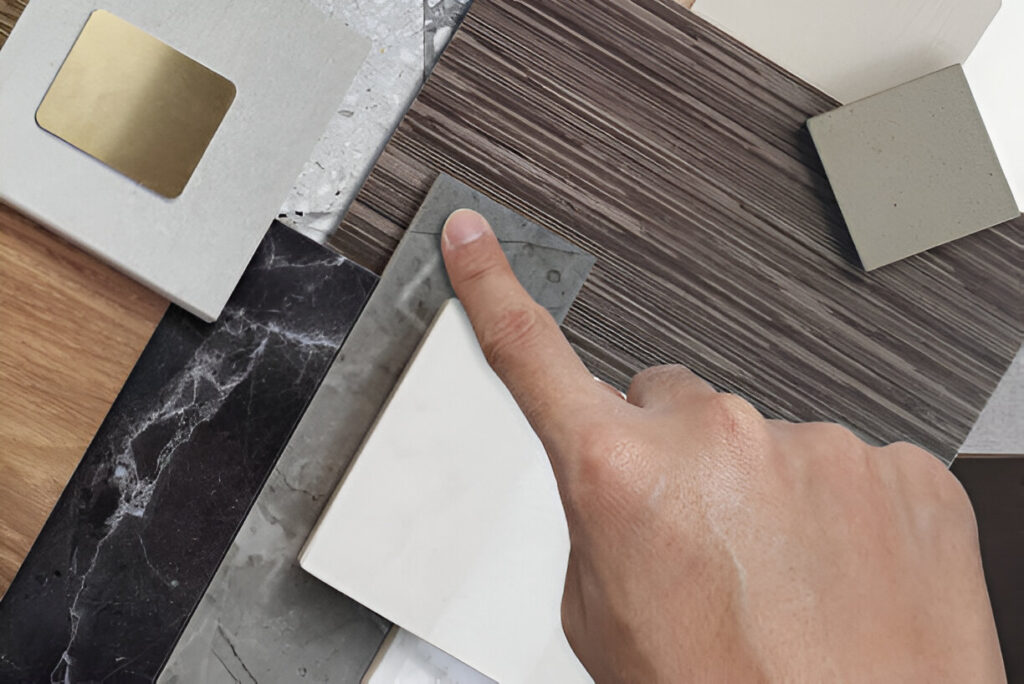Contents
Understanding Solid Surface Countertops
When it comes to kitchen countertops, solid surface materials offer a unique blend of durability and aesthetic appeal. Solid surface countertops are made from a combination of acrylic and polyester materials. This composition ensures that they are durable and resistant to scratches, stains, and heat. Solid surface countertops are also non-porous, making them hygienic and easy to clean. Unlike natural stone countertops, they do not require sealing to maintain their beauty and functionality.
The Composition and Durability of Solid Surface Countertops
Solid surface countertops are composed of a blend of acrylic and polyester materials, which gives them their strength and durability. These materials are bonded together to create a solid, homogeneous surface that is resistant to scratches, stains, and heat. The composition of solid surface countertops also makes them non-porous, meaning that liquids and bacteria cannot penetrate the surface, making them easy to clean and maintain.
In terms of durability, solid surface countertops are built to last. They are resistant to chips and cracks, and they can withstand everyday wear and tear without losing their functionality. However, it is important to note that solid surface countertops are not completely immune to damage. While they are highly durable, excessive force or impact can still cause them to chip or crack.
The Aesthetic Appeal and Design Options of Solid Surface Countertops
One of the biggest advantages of solid surface countertops is their aesthetic appeal and design options. Solid surface materials can be manufactured to resemble a variety of natural materials, such as granite or marble, offering a sophisticated and luxurious look for your kitchen.
Additionally, solid surface countertops come in a wide range of colors and patterns, allowing you to choose the perfect style to complement your kitchen’s design. Whether you prefer a classic, timeless look or a more modern, bold statement, there is a solid surface countertop option that will suit your taste.
The Maintenance and Care Tips for Solid Surface Countertops
Maintaining and caring for solid surface countertops is relatively easy compared to other materials. Since solid surface countertops are non-porous, they are resistant to stains and can be easily wiped clean with a mild soap and water solution.
However, solid surface counters are not completely scratch-resistant. While they are resistant to normal wear and tear, it is nevertheless advisable to use cutting boards and avoid dragging heavy things across the surface to avoid scratches. If minor scratches occur, they can usually be removed with a mild abrasive cleanser or fine-grit sandpaper.
Another crucial part of keeping solid surface countertops is to prevent exposing them to too much heat. While they are heat-resistant and can sustain temperatures up to a certain point, it is always preferable to use trivets or hot pads to shield the surface from direct heat sources like hot pans and pots.
Exploring the Beauty of Quartz Countertops
Quartz countertops have been extremely popular in recent years due to their durability and adaptability. Unlike solid surface counters, quartz countertops are engineered stone surfaces composed of natural quartz crystals and resin. This revolutionary manufacturing process produces countertops that have the appearance of natural stone but are more durable and require less upkeep.
The Science Behind Quartz: What Makes It Unique?
Quartz is a mineral that is abundant throughout the Earth’s crust. It is noted for its hardness and durability, making it an excellent choice for countertops. Quartz countertops are made by grinding natural quartz crystals into a fine powder and then combining them with resin and other chemicals. This combination is then compacted under high pressure and cured, yielding a solid, non-porous surface.
What sets quartz apart from other countertop materials is its consistency. Quartz countertops have a uniform appearance with little to no variation in color or pattern. This allows for a clean and modern look that can complement any kitchen design.
The Versatility of Quartz: Customizing Colors and Patterns
The variety of hues and patterns available in quartz countertops is one of their greatest features. Since quartz countertops are engineered, manufacturers have the ability to control the colors and patterns more precisely compared to natural stone materials.
Quartz worktops are available in an extensive array of colors, ranging from traditional whites and neutrals to strikingly bright shades. Quartz countertops with designs evoking natural stones like granite or marble can also be produced by manufacturers. This eliminates the need for upkeep and care while yet giving homeowners the appearance of luxurious genuine stone.
Quartz Countertops: A Low-Maintenance Solution
One of the major advantages of quartz countertops is their low maintenance requirements. Unlike natural stone countertops, quartz countertops are non-porous and do not require sealing. This makes them resistant to stains, bacteria, and mold, making them an ideal choice for kitchen countertops.
Cleaning quartz countertops is as simple as applying a light soap and water solution. They may also tolerate basic household cleansers without fading or discoloration. However, abrasive cleaners and scrub brushes with sharp bristles should be avoided because they might degrade the quartz’s surface.
Another advantage of quartz countertops is their resistance to heat. While they are not completely heat-proof, they can withstand moderate heat, making them suitable for everyday kitchen activities. To shield the surface from intense heat sources, trivets or hot pads are still advised.
Comparing Solid Surface and Quartz Countertops
Both solid surface and quartz countertops offer unique advantages and considerations. Here is a comparison of key factors to help you decide which material is right for your kitchen countertops.
Cost Comparison: Finding the Right Balance Between Quality and Budget
In terms of pricing, solid surface countertops are typically less expensive than quartz counters. Solid surface materials are often less expensive per square foot, making them an attractive option for budget-conscious homeowners.
Quartz countertops, on the other hand, are often more expensive due to the production process and use of natural quartz crystals. Quartz countertops, on the other hand, can be a more cost-effective solution in the long run due to their longevity and low maintenance requirements.
The Eco-Friendly Factor: Which Material is More Sustainable?
When it comes to sustainability, solid surface countertops have the advantage. Solid surface materials are made from a blend of acrylic and polyester, which can be recycled and repurposed at the end of their lifespan. This makes solid surface countertops a more eco-friendly choice compared to quartz countertops.
Quartz countertops, on the other hand, are formed of natural quartz crystals dug from the ground. While quartz is a common resource, the mining and manufacturing processes for quartz countertops can have a bigger environmental impact than solid surface alternatives.
The Resale Value: Will Solid Surface or Quartz Countertops Increase Your Home’s Worth?
When it comes to the resale value of your home, both solid surface and quartz countertops can add value to your kitchen. Both materials offer durability and aesthetic appeal, which are key selling points for potential buyers.
However, quartz countertops tend to be more desirable among homebuyers due to their association with high-end materials like marble and granite. The uniform appearance and customizability of quartz countertops can also make them a selling point for homeowners looking for a modern and stylish kitchen.
Choosing the Perfect Material for Your Kitchen Countertops
The ideal material for your kitchen countertops will ultimately depend on your personal tastes and requirements. Here are some important things to think about before choosing.
Considering Your Lifestyle: Which Material Fits Your Needs?
Think about your lifestyle and how you use your kitchen countertops. If you have a busy household with children or frequently host social gatherings, durability and resistance to stains and scratches may be a top priority. In this case, solid surface countertops may be the best choice for you.
Alternatively, if you are looking for a luxurious and high-end appearance and do not mind investing in higher maintenance, quartz countertops can provide the aesthetic appeal you desire.
The Style Factor: Which Material Complements Your Kitchen’s Design?
Think about your kitchen’s general design and style. With so many colors and patterns available for solid surface countertops, you can easily pick a style that matches the overall aesthetic of your kitchen.
Conversely, quartz countertops have a sleek and contemporary appearance that goes well with any design, conventional or contemporary. Quartz’s mutable hues and patterns provide countless creative options.
The Decision-Making Process: Key Factors to Help You Make the Right Choice
In addition to cost, sustainability, and resale value, there are a few other factors to consider when making the final decision.
Firstly, consider the level of maintenance and care you are willing to invest in your countertops. Solid surface countertops are generally low-maintenance and easy to clean, while quartz countertops require more care to maintain their beauty and functionality.
Secondly, think about the overall look and feel you want to achieve in your kitchen. Solid surface countertops can provide a more natural and warm appearance, while quartz countertops offer a sleek and modern aesthetic.
Lastly, consider your long-term plans for your home. If you plan to stay in your current home for a long time, investing in quartz countertops may be a worthwhile investment. However, if you are looking for a cost-effective solution or plan to sell your home in the near future, solid surface countertops may be the better choice.
If you are considering between solid surface vs quartz countertops, know their unique advantages and considerations. By considering your budget, lifestyle, design preferences, and long-term plans, you can make an informed decision that suits your needs and preferences.



